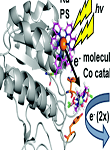|
|
|
EDITORIAL : Proteins as a source for Hydrogen Fuel
|
|
|
|
|
|
|
|
|
|

|
|
|
|
Sumit O. Bajaj, PhD
|
|
|
|
The Scripps Research Institute
|
|
Department of Chemistry and Chemical Biology, The Scripps Research Institute, 10550 North Torrey Pines Road, La Jolla, CA 92037, USA
|
|
sobajaj@scripps.edu
|
|
|
|
|
|
|
|
|
|

|
|
To accommodate the increasing energy demands, new techniques for the production, conversion and storage of energy are required. Solar energy is a natural, free and abundant source of energy from the sun and can be converted to various forms. As hydrogen possesses ~120-140 MJ/kg storage capacity and is a clean energy source, it can be studied as a future efficient and eco-friendly fuel. Studies directed towards converting solar energy for H2 production using catalysts are currently underway, but locating a fit catalyst is challenging. Dr. Soltau’s review covers emerging opportunities using natural protein structures as a booming source towards the conversion of solar energy to H2 production.
|
|
|
|
|
|
|
|

|
|